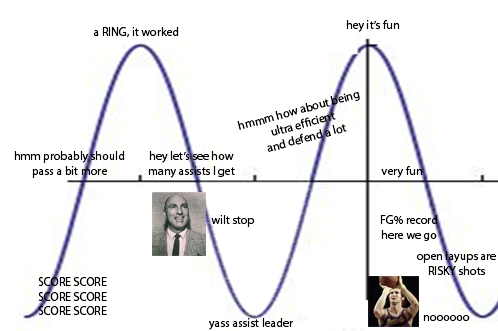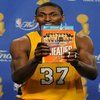How many defensive bigs in history were as good or better than Tim Duncan over, say, a 12-14 year period of time?
We can debate this, but that short answer is: not very many (and one of the very few that were has already been voted in).
Offense
I'm going to again present some comparison of his data (mostly just the offensive figures) vs Hakeem, who is almost universally considered a better offensive big (some would have us believe by a large margin, too)....
Peak Olajuwon '93-’94
Per 100 poss (rs): 33.6 pts, 4.5 ast, 4.1 tov @ 57.10% ts (+3.89% to league)
PER 26.3, .222 WS/48, 111 ORtg/96 DRtg (+15), BPM +7.0 in 40.2 mpg
Per 100 poss (playoffs): 34.3 pts, 5.5 ast, 4.5 tov @ 56.8% ts (+3.6% to league)
PER 27.3, .213 WS/48, 110 ORtg/97 DRtg (+13) in 43.1 mpg
Peak Duncan '02-’03
Per 100 poss (rs): 32.5 pts, 5.1 ast, 4.2 tov @ 57.03% ts (+5.04% to league)
PER 27.0, .253 WS/48,113 ORtg/95 DRtg (+18), BPM +6.9 in 39.9 mpg
Per 100 poss (playoffs): 32.2 pts, 6.6 ast, 4.3 tov @ 56.9% ts (+4.9% to league)
PER 29.3, .270 WS/48, 114 ORtg/93 DRtg (+21) in 42.5 mpg
Career Olajuwon
Per 100 possessions (rs): 30.3 pts, 3.4 ast, 4.1 tov @ 55.3% TS (+2.13% rTS)
PER 23.6, .177 WS/48, 108 ORtg/98 DRtg (+10), +4.9 BPM in 35.7 mpg
Per 100 possessions (playoffs): 33.7 pts, 4.1 ast, 3.8 tov @ 56.9% TS
PER 25.7, .189 WS/48, 112 ORtg/101 DRtg (+11), +7.1 BPM in 39.6 mpg
Career Duncan
Per 100 possessions (rs): 29.7 pts, 4.7 ast, 3.8 tov @ 55.1% TS (+1.98% rTS)
PER 24.2, .209 WS/48, 110 ORtg/96 DRtg (+14), +5.5 BPM in 34.0 mpg
Per 100 possessions (playoffs): 29.7 pts, 4.4 ast, 3.6 tov @ 54.8% TS
PER 24.3, .194 WS/48, 110 ORtg/99 DRtg (+11), +5.9 BPM in 37.3 mpg
In short, Duncan is much better offensive player than he's often given credit for.
Rebounding is a small edge to Duncan as well, fwiw.
Leadership
For this I'm going to present some previous material:
Terance Wolfe, a professor of clinical management and organization at the University of Southern California’s Marshall School of Business, sees the parallel with how the Spurs achieved sustained success and how businesses thrive
So the Spurs were the first NBA team to operate like a corporation, and Brent Barry said that Tim Duncan would be the CEO of that corporation. Spurs general manager R.C. Buford said that “The truth is we all work for Timmy.” “We all see it R.C.’s way,” said Sean Elliott, who played 11 of his 12 seasons in the NBA with the Spurs (1989-90 to 1992-93, 1994-95 to 2000-01), the last four of those with Duncan. “We’re not dumb. We all know we wouldn’t have any rings without Timmy. Everybody understands that. We all feel like we’re working for Timmy.”
So the Spurs were the first NBA team team to operate like a corporation, Brent Barry said Duncan was the CEO of that corporation, and R.C. Buford and Sean Elliot both said that they all worked for Duncan.
From Pop's own lips:
Gregg Popovich wrote:Before you start handing out applause and credit to anyone else in this organization for anything that's been accomplished, remember it all starts with and goes through Timmy
Gregg Popovich himself appears to be [quite clearly, I would say] stating that anyone who wants to give him the lion's share of credit for the winning culture in San Antonio is flat wrong. Now maybe he's just putting forth some false modesty, but that's still a really strong statement......a statement which [as noted above] is being seconded by various teammates and the Spurs general manager.
Longevity
Those career numbers I posted above are over 19 seasons, 1392 rs games, 47,368 rs minutes (of the other guys getting serious traction at this point, only Wilt played more rs minutes [barely]). He's also #1 all-time in career playoff minutes played, and has thus played more combined minutes than any player left on the table except for Karl Malone and Kobe Bryant [barely].
Is there player another currently on the table who provides a better/greater combination of offensive output, defensive dominance, two-way impact, leadership, and longevity than Tim Duncan?
I personally don't think so.


























